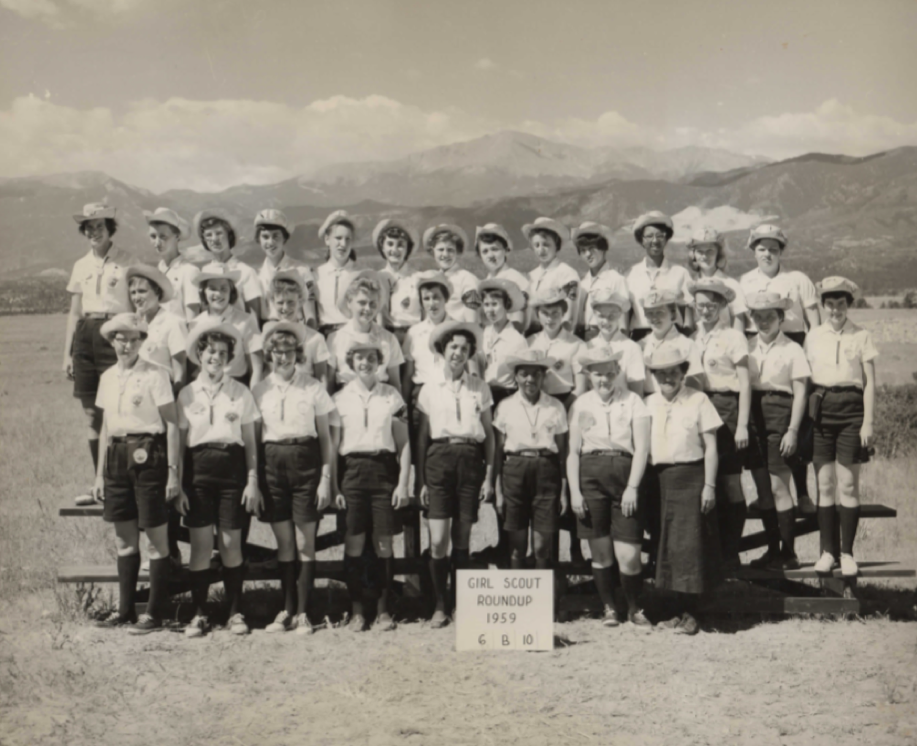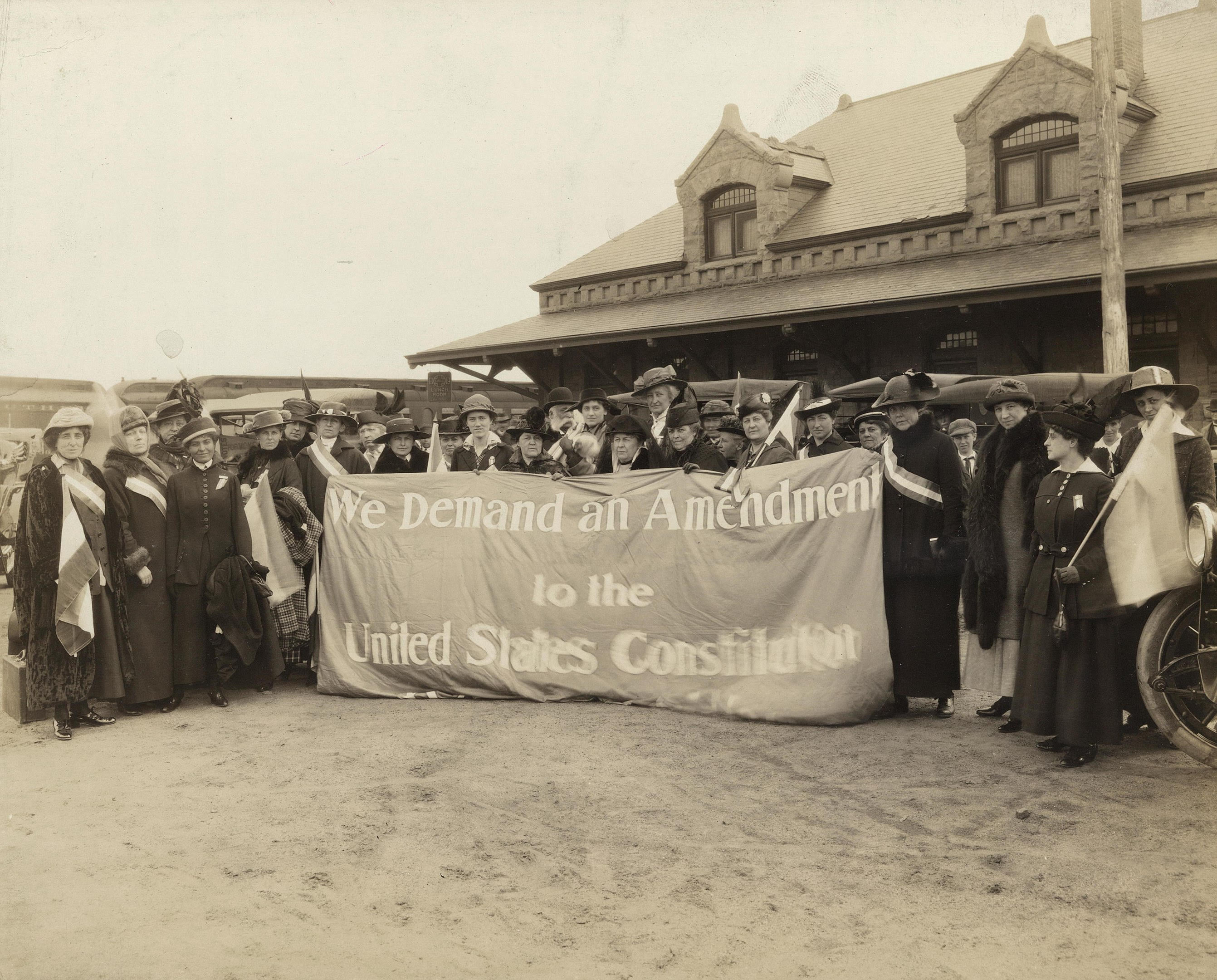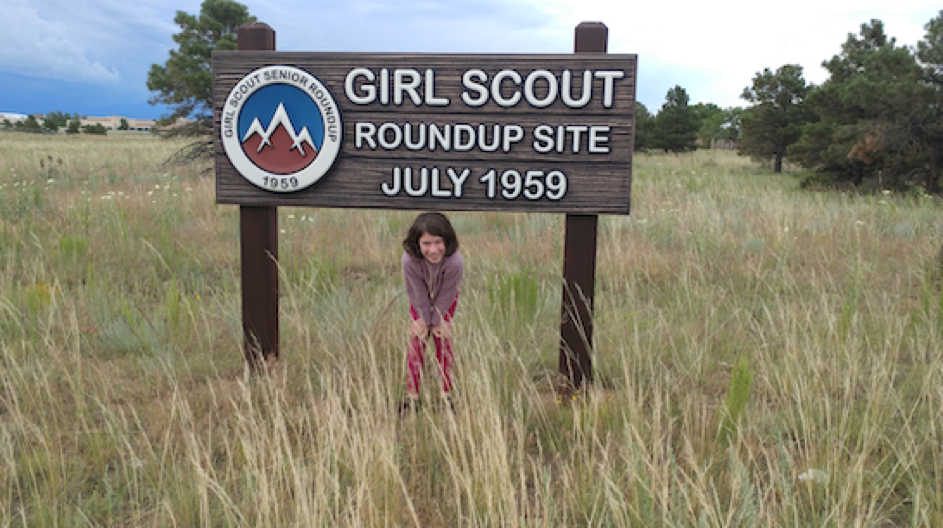Story
Two Trains in the Springs: Women’s Suffrage and the 1959 Girl Scout Roundup
One can only imagine their sense of both frustration and hope as they toured Colorado, which in 1893 had become the first state to prohibit discrimination against women voters; nearly a quarter-century later, a woman’s right to vote had yet to be recognized as national law.
Back to Colorado
Sixty-one years ago, a 16-year-old girl boarded a train near Philadelphia and set out for the West. More than fifty hours later, on the longest and farthest trip she’d ever taken without her parents, she arrived at the Atchison, Topeka & Santa Fe passenger depot in Colorado Springs. She and 10,000 other Girl Scouts and chaperones from twenty-eight countries gathered to spend twelve days in July camping in a field near the U.S. Air Force Academy. With camp themes of “New Frontiers” and “A Mile High, A World Wide,” the young women spent their time sightseeing and learning about friendship and teamwork.
Nine years later, back in Pennsylvania, that girl became my mother.
Now a grandmother who’s still married to her high school sweetheart, she keeps a box of her 1959 Girl Scout Senior Roundup flag, hat, and “swaps”—small tokens of friendship from other Girl Scouts from around the world. And although she has fond memories of that visit to the western High Plains, she hadn’t yet returned to Colorado Springs.

Thousands of Girl Scouts from around the world traveled by train, plane, and automobile to attend the 1959 Girl Scout Senior Roundup in Colorado Springs. (Photo courtesy of Jeanne Cooke, pictured top row, third from left.)
This may help explain why, last year while on vacation in the Springs with my own little Girl Scout, I decided to invite my parents to Colorado for a return visit. I enticed them with offers to explore Pikes Peak, Garden of the Gods, Royal Gorge, the Cave of the Winds, the Manitou Cliff Dwellings, and more. I also offered to take them to the train station at 555 East Pikes Peak Avenue where my mother had disembarked and the wooden sign along Interstate 25 that marks the field where she’d gazed up at the mountains, camped with thousands of other scouts, and helped entertain First Lady Mamie Eisenhower.
My parents agreed to come. In fact, I was so persuasive that my favorite aunt—always up for an adventure—decided to tag along.
The Troops, the Squadron, and the Suffrage Special
Ahead of their visit, I looked for information about Colorado Springs’ old train depot. I quickly found out that there are two, both of them decommissioned and repurposed. As I looked at photos of the Atchison, Topeka & Santa Fe depot, I pictured thousands of Girl Scouts stepping onto station platforms and squinting in the bright Colorado sunshine.
And then another photo caught my eye. It depicted a similar scene from a few decades earlier—an even older depot, and just a mile away.
In 1916, a year before the newer depot was built, another group of women came to Colorado Springs by train, arriving at the Denver & Rio Grande depot on South Sierra Madre Street. These women, who called themselves the Flying Squadron, were also on a mission of connection and female empowerment. Their train was nicknamed the Suffrage Special. To generate support for women’s voting rights, these twenty-three activists had stepped aboard the train in Washington, D.C., and toured the western states for thirty-eight days. In Colorado Springs, they stopped long enough for some speeches, a sightseeing trip in the mountains, and a photo opportunity in front of the depot. Exhibiting various expressions of determination, the women in the photo held flags and a massive banner that read: “We Demand an Amendment to the United States Constitution.”
One can only imagine their sense of both frustration and hope as they toured Colorado, which in 1893 had become the first state to prohibit discrimination against women voters; nearly a quarter-century later, a woman’s right to vote had yet to be recognized as national law.
When they returned to Washington, D.C., the Flying Squadron swooped into the U.S. Capitol Building, where they presented Congress with petitions that they’d collected on their journey. Four years later—one hundred years ago this August—the 19th Amendment was signed into law, prohibiting states and the federal government from denying citizens the right to vote, regardless of gender.

On a western tour to support women’s right to vote in the United States, riders on the “Suffrage Special” train arrived in Colorado Springs in 1916. Photo courtesy of Library of Congress.
Preservation at the Station
This all led me to wonder: What happened to those two depots?
Built in 1917, the Atchison, Topeka & Santa Fe passenger depot supported passenger service until 1971. Eight years later, it was listed in the National Register of Historic Places. In recent years, State Historical Fund grants have been used to repair and clean the exterior masonry and repoint the mortar joints, and a multi-phase project to restore the windows and doors has begun. This depot where my mother disembarked is now the home of Catalyst Campus for Technology & Innovation, a place where small businesses, entrepreneurs, and venture capitalists collaborate with Colorado’s aerospace and defense industry to spur innovation and business growth.
Down the road at the old Denver & Rio Grande depot, which dates back to the late 1800s and is now at the heart of Old Depot Square, you can find restaurants and other businesses. Many locals remember it as the former home of Giuseppe’s, a huge train-themed Italian restaurant that closed in 2011.
Today, these old depots are places where people look to the future or gather with friends. But their historical meaning goes much deeper; these two buildings remind us to appreciate both our right to vote and the strong, idealistic women who’ve left their mark on our lives, our families, and our country.

A modern-day Girl Scout visits the site of her grandmother’s Western adventure. Photo by Brian Cooke.
History Colorado, the Colorado Women’s Vote Centennial Commission and partners around the state are observing the 19th Amendment centennial with a variety of events. The events will give multi-generational audiences the opportunity to learn about the journey and struggle to achieve voting rights, understand the contributions of women in Colorado history, and underscore the value of the right to vote. You can see the full list of events and programming here.
